Big surge for military in Trump budget, big cuts elsewhere
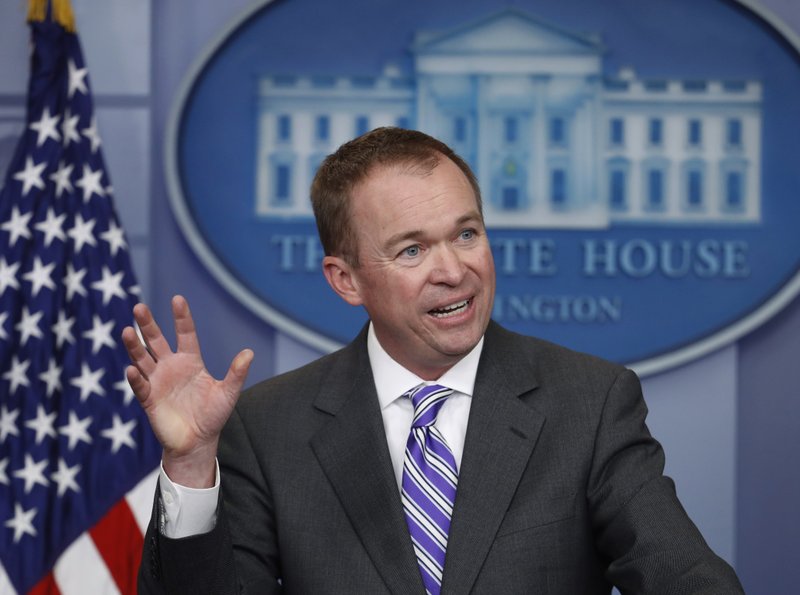
President Donald Trump is proposing a huge $54 billion surge in U.S. military spending for new aircraft, ships and fighters in his first federal budget while slashing big chunks from domestic programs and foreign aid to make the government “do more with less.” The Trump blueprint, due in more detail next month, would fulfill the Republican president’s campaign pledge to boost Pentagon spending while targeting the budgets of other federal agencies. The “topline” figures emerged Monday, one day before Trump’s first address to a joint session of Congress, an opportunity to re-emphasize the economic issues that were a centerpiece of his White House run. Domestic programs and foreign aid would as a whole absorb a 10 percent, $54 billion cut from currently projected levels — cuts that would match the military increase. The cuts would be felt far more deeply by programs and agencies targeted by Trump and his fellow Republicans, like the Environmental Protection Agency as well as foreign aid. Veterans’ programs would be exempted, as would border security, additional law enforcement functions and some other areas. “We’re going to start spending on infrastructure big. It’s not like we have a choice — our highways, our bridges are unsafe, our tunnels,” the president told a group of governors at the White House on Monday. He added, “We’re going to do more with less and make the government lean and accountable to the people.” However, Trump’s final version of the budget is sure to leave large deficits intact — or even add to them if he follows through on his campaign promise for a huge tax cut. His plan faces strong opposition from Democrats, who possess the power to block it. The immediate reaction from Republicans was mixed, with prominent defense hawks like Sen. John McCain of Arizona saying it would do too little to help the Pentagon and fiscal conservatives and supporters of domestic agencies expressing caution. The White House indicated that the foreign aid cuts would be particularly large. Asked about those plans, top Senate Republican Mitch McConnell of Kentucky would say only, “We’ll see how it works out.” A congressional showdown is inevitable later this year, and a government shutdown a real possibility. White House Budget Director Mick Mulvaney said the spike in Pentagon spending would bring the total defense budget to a record $603 billion — and that’s before including tens of billions of dollars for overseas military operations. The United States already spends more on defense than the next seven countries combined, but military leaders have complained repeatedly that aircraft are aging. Congress was told recently that the average age of Air Force aircraft is 27 years, and more than half of the service’s inventory would qualify for antique vehicle license plates in Virginia. “It is a true America first budget. It will show the president is keeping his promises and will do exactly what he said he was going to do,” Mulvaney said. “It prioritizes rebuilding our military, including restoring our nuclear capabilities, protecting the nation and securing the border, enforcing the laws currently on the books, taking care of vets and increasing school choice.” The border wall would cost $2.9 billion in 2018, according to draft documents for the Department of Homeland Security, which assume the agency would hire 500 new members of the Border Patrol and 1,000 new Immigration and Customs Enforcement agents next year. Detention beds for apprehended immigrants would receive $2 billion over current-year spending. The Transportation Security Administration ticket fee would increase by $1 to $6.60 for each one-way flight. Senate Democratic leader Chuck Schumer of New York said, “It is clear from this budget blueprint that President Trump fully intends to break his promises to working families by taking a meat ax to programs that benefit the middle class.” Mulvaney said the plan wouldn’t add to the budget deficit — currently projected to hit about $500 billion next year — but it wouldn’t reduce it, either. The administration again made clear that the government’s largest benefit programs, Social Security and Medicare, would be exempt from cuts when Trump’s full budget submission is released in May. GOP Rep. Mike Simpson of Idaho, a member of the Appropriations Committee, said the large cuts Trump envisions making to domestic programs won’t fly. “There’s a lot of members that have a lot of interest in a lot of these programs,” Simpson said. “There’s more to our government than just defense.” But McCain said Trump’s Pentagon plans would fall short by almost $40 billion and represent just a small increase over former President Barack Obama’s recent Pentagon wish list. “With a world on fire, America cannot secure peace through strength with just 3 percent more than President Obama’s budget,” said McCain, chairman of the Armed Services Committee. On Monday, tentative proposals for the 2018 budget year that begins Oct. 1 were being sent to federal agencies, which will have a chance to propose changes. Before the new budget year, there’s an April 28 deadline to finish up spending bills for the current 2017 budget year, which is almost half over, and any stumble or protracted battle could risk a government shutdown then as well. There’s expected to be an immediate infusion of 2017 cash for the Pentagon of $20 billion or more, and also the first wave of funding for Trump’s promised border wall and other initiatives like hiring immigration agents. Republished with permission of The Associated Press.
Senate narrowly confirms Mick Mulvaney as Trump’s new budget director
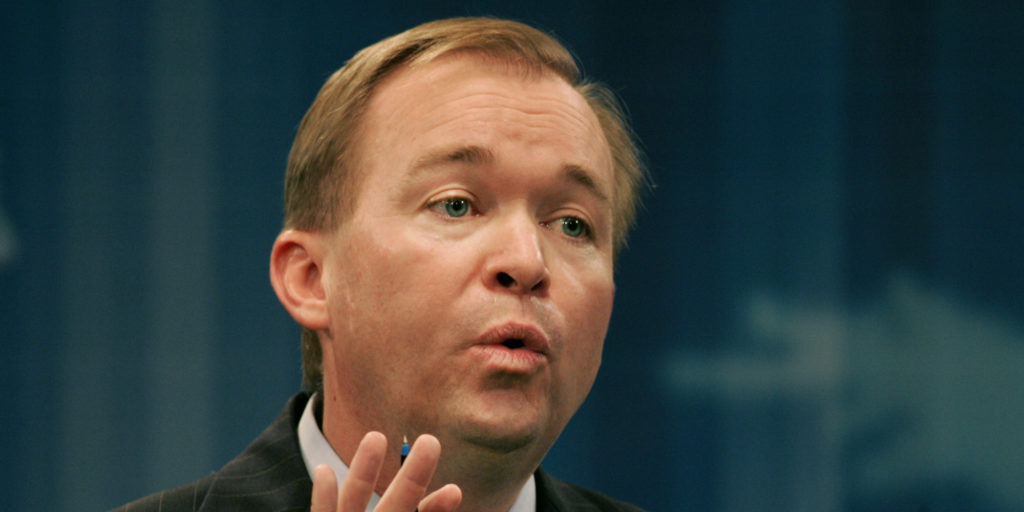
The Senate Thursday confirmed President Donald Trump‘s pick to run the White House budget office, giving the Republicans’ tea party wing a voice in Trump’s Cabinet. South Carolina Rep. Mick Mulvaney squeaked through the Senate on a 51-49 vote. Armed Services Committee Chairman John McCain, who’s emerging as perhaps the most vocal critic of the Trump administration, opposed Mulvaney for past House votes supporting cuts to Pentagon spending. “Mulvaney has spent his last six years in the House of Representatives pitting the national debt against our military,” McCain said. Mulvaney’s confirmation promises to accelerate work on Trump’s upcoming budget plan, which is overdue. That’s typical at the beginning of an administration. But there is also the need to complete more than $1 trillion in unfinished spending bills for the ongoing budget year, as well as transmit Trump’s request for a quick start on his oft-promised U.S.-Mexico border wall and tens of billions of dollars in emergency cash for the military. In the past, Mulvaney has routinely opposed such catchall appropriations bills, which required Republicans to compromise with former President Barack Obama, but the upcoming measure is going to require deals with Democrats The South Carolina Republican brings staunchly conservative credentials to the post, and Trump transition officials have telegraphed he’s likely to seek big cuts to longtime GOP targets such as the Environmental Protection Agency and other domestic programs whose budgets are set each year by Congress. Trump has indicated, however, that he not interested in tackling highly popular benefit programs like Social Security and Medicare and wants a major investment in infrastructure programs like highways. Democrats opposed Mulvaney over his support for curbing the growth of Medicare and Social Security and other issues, such as his brinksmanship as a freshman lawmaker during the 2011 debt crisis in which the government came uncomfortably close to defaulting on U.S. obligations. “He said to me in a one-on-one meeting how he would prioritize the debts he would pay if he defaulted on the debt,” said Sen. Claire McCaskill, D-Mo. “Wouldn’t that be a great addition to the chaos we are all feeling right now?” The vote came a day after Trump’s pick to head the Labor Department, Andrew Puzder, abruptly withdrew his nomination in the face of Republican opposition. Puzder faced questions over taxes he belatedly paid on a former housekeeper not authorized to work in the United States. Mulvaney has managed to survive questions about his failure to pay more than $15,000 in payroll taxes for a nanny more than decade ago. He has since paid the taxes. Republished with permission of The Associated Press.
Mick Mulvaney, Donald Trump’s budget pick, clears initial Senate hurdle
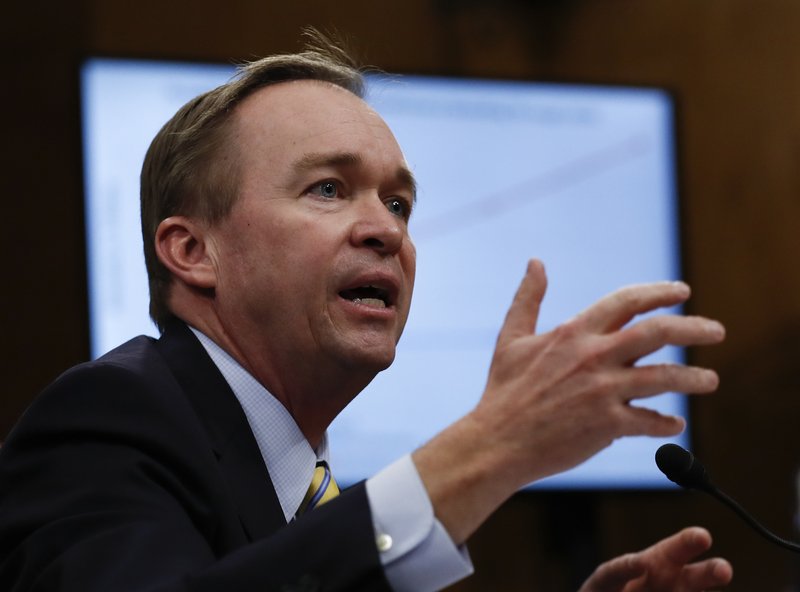
President Donald Trump‘s choice to run the White House budget office Tuesday cleared a routine Senate hurdle. But at least two senior Republicans have voiced doubts about supporting him in Thursday’s confirmation vote. Rep. Mick Mulvaney is a tea party congressman from South Carolina who has attracted likely opposition from Armed Services Committee Chairman John McCain. McCain says Mulvaney’s record of support for military operations in Afghanistan and the Pentagon budget generally is too soft. The Senate voted 52-48 along party lines to advance Mulvaney to a final vote on Thursday, where the outcome is in greater doubt. McCain voted to advance Mulvaney to a final vote but again told reporters that he’s likely to oppose him. Powerful Appropriations Committee Chairman Thad Cochran of Mississippi is also unwilling to commit to supporting Mulvaney in Thursday’s up-or-down vote. Cochran met with Mulvaney on Tuesday and is unwilling to commit to supporting him. “He’s never been a friend of the Appropriations Committee,” Cochran said. “I don’t think he’s ever (liked) an appropriations bill.” Since Democrats are unified against Mulvaney over his support of cutting Medicare spending and his past positions as a tea party firebrand in the House, only two Senate Republicans can defect if he is to be confirmed. If McCain and Cochran oppose Mulvaney on Thursday, Vice President Mike Pence would have to cast a tie-breaking vote to confirm him. The Senate is moving slowly on Trump’s Cabinet. Majority Leader Mitch McConnell on Wednesday warned that continued delays are putting the chamber on course to “working well into the weekend.” Republished with permission of The Associated Press.
Donald Trump says Michelle Obama’s ‘no hope’ comment about the past
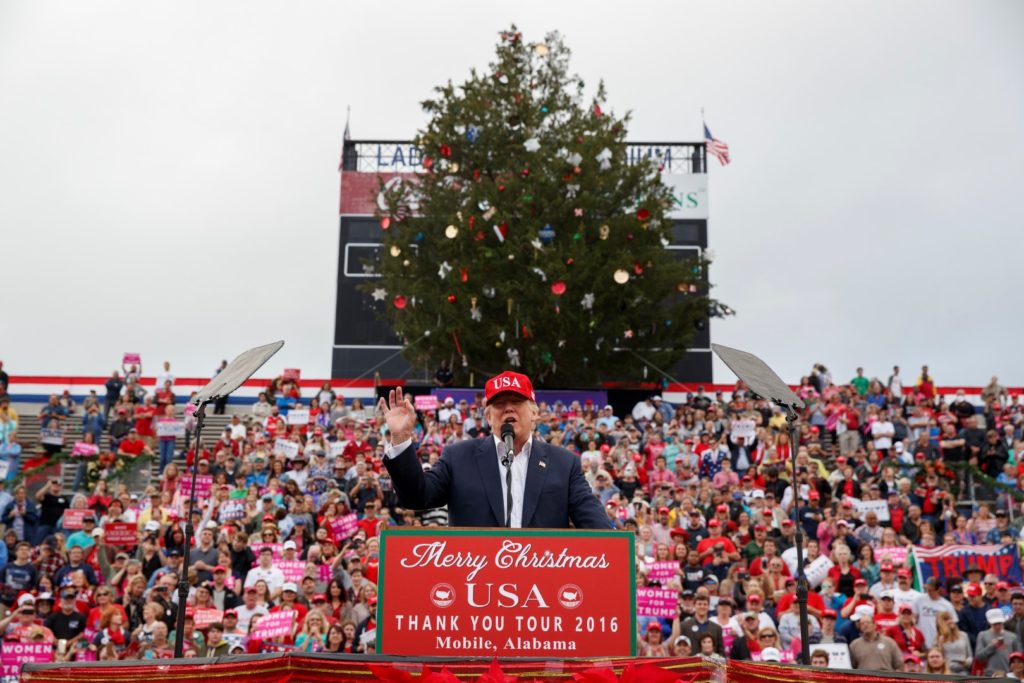
President-elect Donald Trump said first lady Michelle Obama “must have been talking about the past” when she said there’s no sense of hope after his election. Trump, speaking Saturday at the final rally of his postelection “thank you” tour, then resisted escalating the spat further, suggesting “she made that statement not meaning it the way it came out.” But as Trump praised the Obamas for treating him so nicely when he visited the White House shortly after the election, many in the Mobile, Alabama, crowd booed the first family. Michelle Obama, in an interview with Oprah Winfrey set to air Monday on CBS, said she was now certain that her husband’s victory had inspired people because “now we’re feeling what not having hope feels like.” “What do you give your kids if you can’t give them hope?” she added. Trump’s comments about Michelle and President Barack Obama was one of the few conciliatory notes he sounded during a victory tour in which he showed few signs of turning the page from his blustery campaign to focus on uniting a divided nation a month before his inauguration. At each stop, the Republican gloatingly recapped his election night triumph, reignited some old political feuds while starting some new ones, and did little to quiet the hate-filled chants of “Lock her up!” directed at Democratic rival Hillary Clinton. At the tour’s finale at the same football stadium in Mobile that hosted the biggest rally of his campaign, Trump saluted his supporters as true “patriots” and made little attempt to reach out to the more than half of the electorate that didn’t vote for him. “We are really the people who love this country,” said Trump. He reminisced about his campaign announcement and his ride down Trump Tower’s golden escalator. His disputed a newspaper’s account of the size of the crowd at one of his rallies and bashed the press as dishonest. And he joked that he had booked a small ballroom for his election night party so, if he lost, he “could get out!” He paid homage to the August 2015 rally in the same stadium that he said jump-started his campaign. Though the crowd was not as large on Saturday, it was no less fervid, repeatedly chanting “Build the wall!” when Trump renewed his vow to build an impenetrable border at the Mexican border. Trump brought his nominee for attorney general, Sen. Jeff Sessions of Alabama, up onstage to receive cheers from his hometown crowd. When Trump’s plane landed, he received a water cannon salute from a pair of fire trucks and was greeted by several Azalea Trail Maids, local women dressed in antebellum Southern Belle outfits. The raucous rallies, a hallmark of his campaign, are meant to salute supporters who lifted him to the presidency. But these appearances also have been his primary form of communication since the Nov. 8 election. Trump has eschewed the traditional news conference held by a president-elect within days of winning. He’s done few interviews, announced his Cabinet picks via news release and continues to rely on Twitter to broadcast his thoughts and make public pronouncements. That continued Saturday morning when Trump turned to social media to weigh in on China’s seizure of a U.S. Navy research drone from international waters, misspelling “unprecedented” when he wrote “China steals United States Navy research drone in international waters – rips it out of water and takes it to China in unpresidented act.” He later corrected the tweet. China said Saturday it intended to return the drone to the U.S. Within days of beating Clinton, Trump suggested to aides that he resume his campaign-style barnstorming. Though he agreed to hold off until he assembled part of his Cabinet, Trump has repeatedly spoken of his fondness for being on the road. Aides are considering more rallies after he takes office, to help press his agenda with the public – a possibility that Trump embraced from the stage Saturday. But Trump has also sounded some notes of unity on the tour. In Mobile, he acknowledged that “now the hard work begins” and ended with a plea for all Americans, including those who did not support him, to “never give up.” After the rally, Trump planned to return to Mar-a-Lago, his Palm Beach estate. Aides said the president-elect probably would spend Christmas week there and could stay until New Year’s. Earlier Saturday, he announced the nomination of South Carolina Rep. Mick Mulvaney to head the Office of Management and Budget, choosing a Tea Partyer and fiscal conservative with no experience assembling a government spending plan. Mulvaney, a founder of the hard-right House Freedom Caucus, has taken a hard line on budget matters, routinely voting against increasing the government’s borrowing cap and pressing for major cuts to benefit programs as the path to balancing the budget. Republished with permission of The Associated Press.
Prospective speakers multiply in House as all wait on Paul Ryan
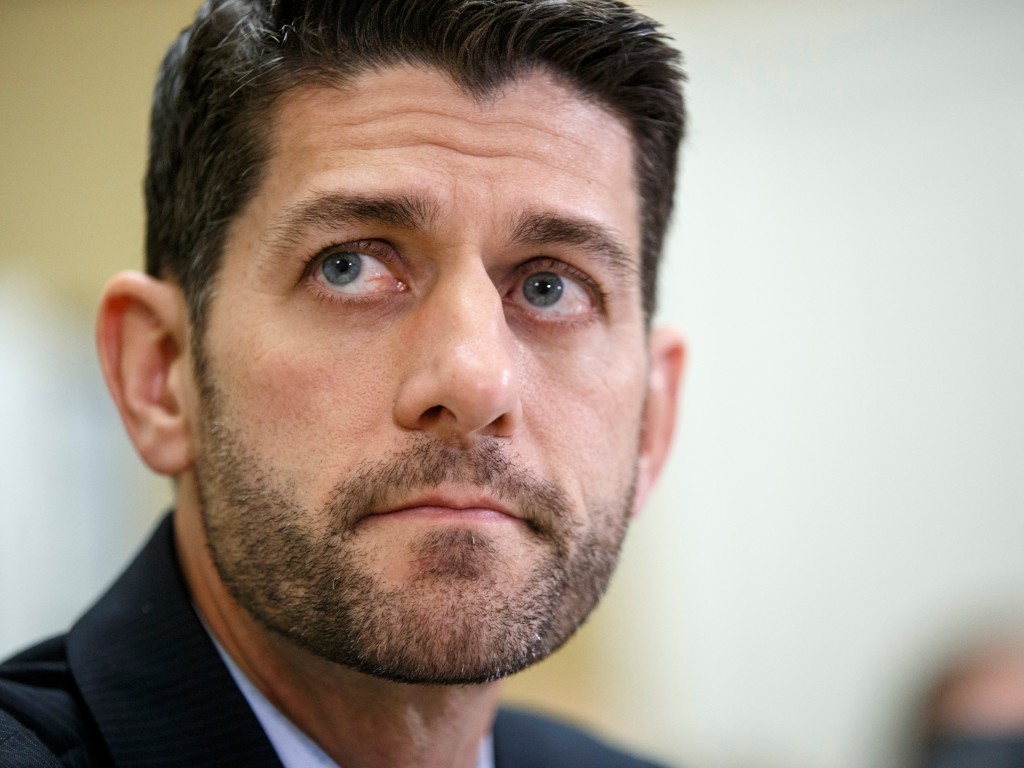
Every day another Republican lawmaker seems to wake up and decide that he – and in at least one case, she – might make a pretty good speaker of the House. The profusion of potential candidates, now approaching double digits, is happening even with all attention focused on Wisconsin Rep. Paul Ryan, the former GOP vice presidential nominee widely seen as the best person for the job. Ryan, who has made clear he does not want to be speaker, is home in Janesville, Wisconsin, thinking it over anyway under pressure from top party leaders. And with Congress out of session for a weeklong recess, Capitol Hill has fallen quiet after a series of wild days during which Speaker John Boehner shocked the House by announcing his planned resignation, and Boehner’s heir apparent, Majority Leader Kevin McCarthy, abruptly took himself out of the running. The stunning developments left a leadership vacuum at the pinnacle of Congress. Now into it are stepping a growing number of Republican lawmakers from around the country, some relative newcomers, others with experience to point to, united by a chance to lunge at the once-in-a-lifetime opportunity to become speaker of the U.S. House, second-in-line to the presidency. Why any of them would want a job that defeated the current occupant and scared off his No. 2 is another question. The daunting rift between establishment-minded lawmakers and the hard-line conservatives who pushed Boehner to the exits shows no sign of dissipating, and threatens to complicate life for whoever next occupies the speaker’s chair. Congress also faces a series of formidable tasks over the next several months, including increasing the federal borrowing limit to avoid a default and paying the government’s bills to stave off a shutdown. Nevertheless, the wannabe speakers are multiplying. “I am humbled to have my name mentioned as a potential candidate, and I am considering the pursuit of the speakership in response to those requests,” Rep. Bill Flores, R-Texas, wrote in a letter to fellow House members Wednesday. “If we all spend enough time on our knees praying for each other, we can heal our divisions and truly work together to restore America to the ‘Shining City on a Hill’ that President Reagan challenged us to become.” Rep. Mike Pompeo, R-Kansas, released a statement observing: “I know every member of the House is looking for the right person. If I can serve the American people and the conservative movement in any way, sign me up. However, a couple weeks ago I was floated as a presidential candidate, so I might be pretty busy.” And a freshman congressman from Montana, Ryan Zinke, got into the action. “We’re looking at it. Our phones are ringing off the hook because I think America wants something different,” Zinke said. “I haven’t decided, but what I have decided is that Congress better do our duty and defend our values of this country.” Several of the lawmakers sought to make clear that they were being urged by their fellow Republicans to run for speaker; not doing so out of their own ambitions. And several also took pains to make clear that they would run only if Ryan does not. “We are all hopeful that Paul is going to say that he would appreciate the opportunity to serve as speaker,” said Rep. Marsha Blackburn of Tennessee, adding that she’s been encouraged by colleagues to look at the job. “It is going to take a listening ear and a steady head to walk our conference through some of these issues,” she said. Others who’ve suggested their interest in the speakership, or contacted fellow lawmakers to sound them out, include GOP Reps. Michael McCaul and Michael Conaway of Texas, Lynn Westmoreland of Georgia, and Darrell Issa of California. Reps. Daniel Webster of Florida and Jason Chaffetz of Utah were running against McCarthy before he dropped out, and remain in the race. Still others, such as Rep. Matt Salmon of Arizona, have seen their names pushed by outside groups seeking new leadership for the House GOP. “These are all really, really, good people, and I think if they could convince the conference that they would run the conference in a way that’s more member-oriented, many of them could be good speakers,” GOP Rep. Mick Mulvaney of South Carolina, a founding member of the hard-line House Freedom Caucus, said in an interview after several potential candidates contacted him to gauge support. Although Ryan would be the prohibitive favorite for the job if he does seek it, Mulvaney and others disputed arguments that he’s the only one who could unite the House GOP. Ryan, an expert on budgetary matters who chairs the tax-writing Ways and Means Committee chairman, is already drawing criticism from some on the right for his support for comprehensive immigration legislation and government bailouts. “I like him and I respect him, and I think there are a number of directions he might take us that I don’t want to go, and immigration is one of those,” said Rep. Steve King, R-Iowa. “I don’t think he would be one who would transform (the House) and turn it into a membership-driven organization and I think this is our one chance to do that.” Republished with permission of the Associated Press.


